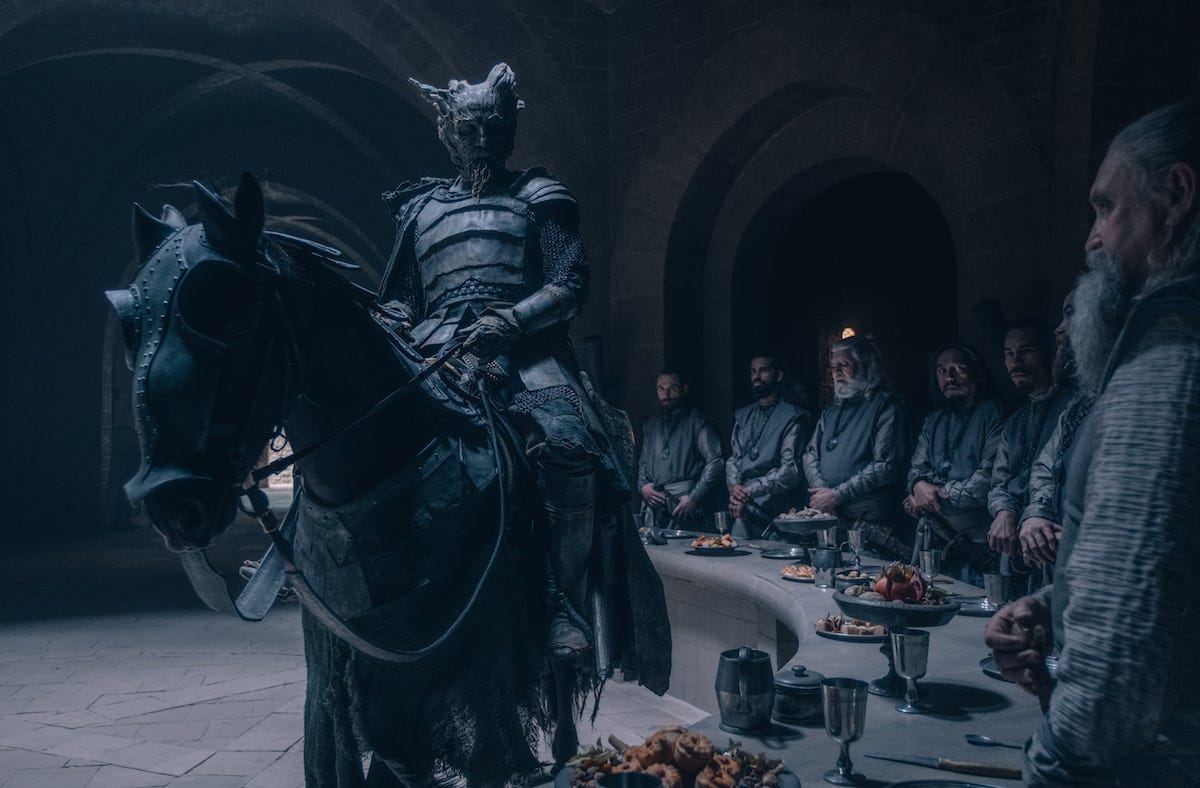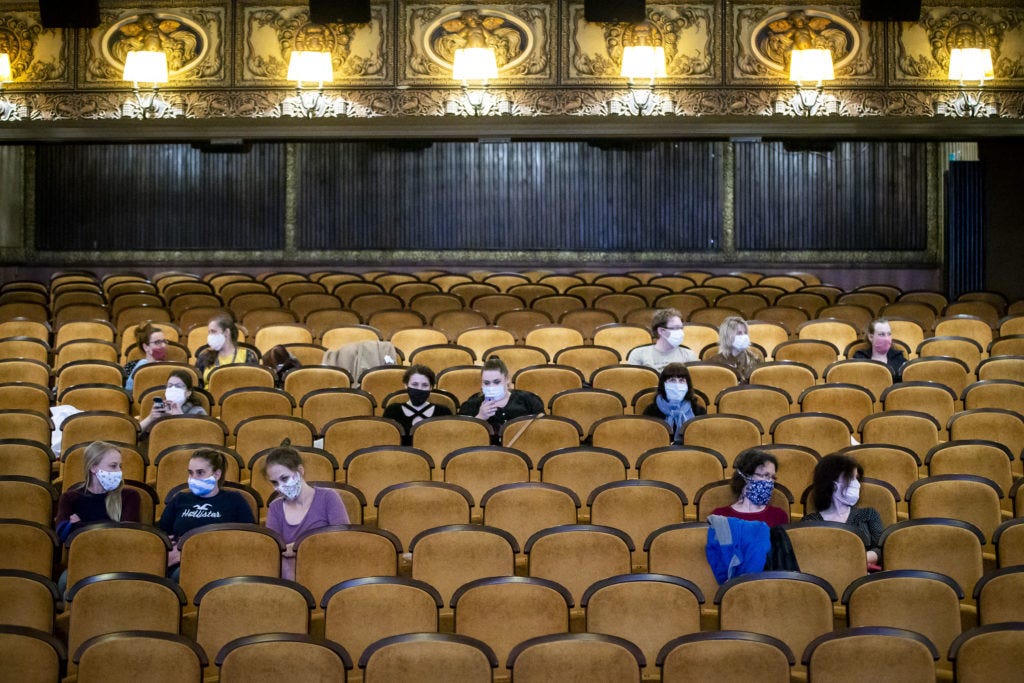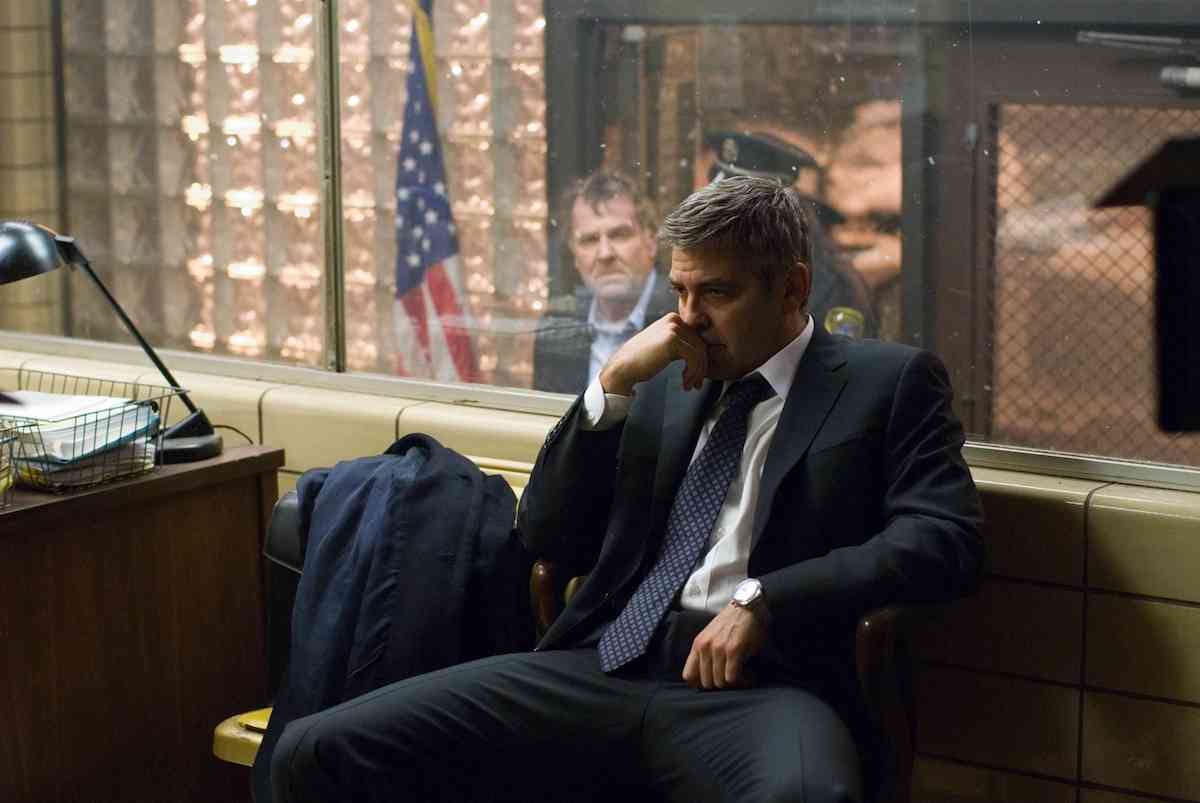'The Green Knight' Review
Plus: Is Delta going to crush movie theaters again?
The Green Knight Review
The movie that The Green Knight most calls to mind isn’t an Arthurian tale like Excalibur or King Arthur, nor a fantasy epic like Pan’s Labyrinth or Labyrinth, but a Martin Scorsese classic.
From the episodic structure of the storytelling to the symbolic and mythos-laden nature of the episodes themselves to the questions of duty and honor and sacrifice to the final moments, when our hero, Gawain (Dev Patel), is confronted with the notion of what it means to live without the honor he has sought, The Green Knight most reminded me of The Last Temptation of Christ.
The plot, such as it is, is relatively straightforward. During a Christmas Eve celebration, King Arthur (Sean Harris), his Queen Guinevere (Kate Dickie), and the knights of the Round Table—along with Gawain, Arthur’s nephew—are confronted by a strange, plant-like Green Knight (Ralph Ineson). This verdure visage challenges those present to a game: land a blow, win an axe. But in return, the same blow must be repaid the next year at Christmas in the Green Chapel several days north of Camelot.
Gawain, previously chastened by the fact that he has no stories to tell of himself and his exploits, accepts the challenge. And when the Green Knight presents his neck, Gawain uses the borrowed Excalibur to cut off the Groot-like head bowed before him. Except, whoops: the knight’s not dead. And that blow must be repaid one year later. Gawain’s travels and his ultimate confrontation with the knight make up the rest of the film.
I’ll pause here to note something that I realize now, only as I write this: Unless I’m mistaken, the words “Arthur,” “Guinevere,” and “Excalibur” are never spoken. Checking IMDB, none are named as such. Perhaps the word Arthur is spoken briefly in an opening bit of poetry that sets the stage, informing us that this is not that king we know of who retrieved the sword from the stone but another, the next. I do not believe Gawain’s mother and Arthur’s half-sister, Morgause, is named. We glimpse Merlin briefly on a handful of occasions, but he is not named Merlin. Magic simply swirls around him, as it swirls around everyone and everything else in this mist-swept vision of else-when.
My point, insofar as I have one, is that writer/director David Lowery isn’t doing much in the way of hand-holding and we are encouraged to fill in gaps as we go with what we already have in our mental storehouse. It is open-ended to the point of frustration, possibly. The film’s final line elicited an audible snort and a “What?” from one of the gentlemen in my auditorium. I did not take him to be a fan of the picture.
The Green Knight is undoubtedly beautiful. Every shot is perfectly framed. The lighting is ethereal and strange, shades of yellow and red and green filtering through the dust motes. It is filled with odd and entertaining little performances: Barry Keoghan (Dunkirk) has a suitably twitchy and squinty turn as a highwayman, while Joel Edgerton plays the lord of a home near the Green Chapel with a merriness in his small, round eyes and a secret laying somewhere behind them.
It is equally undoubtedly weird. Look, let’s just be honest: This is a weird movie. It’s entertainingly different, and it’s no wonder that critics have rallied behind it; we spend too much time watching franchise pap and CGI mush not to be excited when something unusual and wonderfully weird flits across our screen. (It falls neatly into the category of “interesting cinema.”) But I’m very curious to see what the rank-and-file moviegoers make of it.
Do the noble thing and share this newsletter with the movie lover in your life, especially if they’re looking for something a little weird to watch this weekend. And make sure to check out my essay on Nicolas Cage’s late-stage career explaining why he’s one of our most interesting actors even if most of the movies he’s in aren’t that good.
Is Delta a risk to movie theaters?
This week on The Bulwark Goes to Hollywood, I talked to Ryan Subers of National Research Group. Now, those who don’t pay close attention to Hollywood business might not recognize NRG, but they’re an incredibly important polling firm that helps the studios determine how their movies are tracking—that is, how many people are aware of the movies and what’s coming out in any given week—and, thus, how to determine everything from marketing campaigns to release dates.
With the rise of COVID, NRG has had to shift a bit. Given that movie releases are in flux and audience numbers are down somewhat, they began polling about the comfort levels for regular moviegoers (defined as people who saw a movie in theaters four times per year, pre-COVID) and the awareness those polled had about whether or not their local theaters are open.
The results track with about what you might expect. When studios pulled releases from theaters last year, consumer comfort with going to movie theaters plummeted from an already-low 57 percent saying they were “very or somewhat comfortable” going to the movies to a catastrophic 27 percent over a one-week span between March 15, 2020 and March 22, 2020.
That figure would eventually crater at 19 percent in April. Since bottoming out, moviegoer comfort has increased: It took almost exactly a year to get back to that 57 percent mark, and another couple of months to get back to the high-water mark two weeks ago: 81 percent of those polled on Sunday, July 11 said they were very or somewhat comfortable going back to movies.
But since then, the numbers have started to creep down a bit. The number is down to 74 percent.
“That is due to the surge in the Delta variant,” Subers said. “It was starting to pick up two weeks ago, but the headlines have started to change in that direction. The caseload, you know, has gone up dramatically in that time period. So, we have seen it come back a bit. The important thing to note on that is that that level is essentially where we were in June.”
June, you’ll remember, saw some relatively big box-office successes: A Quiet Place Part II opened in the last days of May and continued strong through June, while F9 did solid numbers opening weekend before dropping pretty hard. All of which is to say that 74 percent isn’t a death knell.
But it’s not great either. And with more localities re-imposing mask requirements and more people getting freaked out about doing things indoors despite the fact that the vaccines available for COVID are remarkably effective at keeping people from getting seriously ill even as the Delta variant increases transmissibility, theater owners and the studios that supply them with product have got to be sweating a bit.
Then again, how are people supposed to respond when Disney is out there implying that Scarlett Johansson wants them to die by seeing Black Widow in theaters?
Assigned Viewing: Michael Clayton (HBO Max)
2007 remains one of the strongest movie years in recent memory. Consider, just for starters, that the two best movies of that decade—There Will Be Blood and No Country for Old Men—were released in back-to-back months. This was also the year when Children of Men and Pan’s Labyrinth were released, when an R-rated action film like 300 could still crack the year-end box office top ten, when The Assassination of Jesse James by the Coward Robert Ford dropped. Ratatouille and Persepolis were showing how different and how great animation could be.
It’s also the year Michael Clayton debuted. And I don’t think it’s right to suggest the film has ever been underrated—it was nominated for Best Picture alongside the brilliant Blood and Country, as well as the delightful Juno and the, you know, whatever Atonement; it is 91 percent fresh on Rotten Tomatoes—but it’s certainly underappreciated. George Clooney gives arguably his best performance ever in this film as the fixer for a law firm who finds himself in dutch with both the mob and big pharma. Tom Wilkinson is magnetic as a manic-depressive attorney who realizes he’s on the wrong side of morality and has to decide if he’s crazy enough to do the right thing. Tilda Swinton sweats through a shirt like no woman you’ve ever seen.
The whole thing is just great, convoluted without being difficult to follow, tricky without feeling cheap. Treat yourself to a nice night in with Tony Gilroy’s best film.






I noticed that Lowry guy is really good at making interesting fifteen minute sequences to end a movie. He had one in "Ghost Story," which is a movie I enjoyed much more than this one.
This Average Joe movie watcher couldn't stand most of Green Knight. Dev Patel is likable, but I didn't think he had nearly the weird energy to do something like this. I hated the odd-anti plot, and completely understand what you said about incoherent motivations. I didn't even think it was the visually pleasing. It had a unique general look, but there was never a moment that made me feel any amazement. I saw it on a Tuesday night with six other people in the audience, and I think they disliked it as least as much as I did...I heard a kindly old woman muttering to her son about metaphors. I think you're also completely right that people aren't going to connect with this.
I don't care if it's horrible. I'll watch almost anything now as long as it isn't
1. a superhero movie.
2. A sequel prequel
3. A spinoff
4. A kids movie
5. Something based on a tv show or a ride at Disney